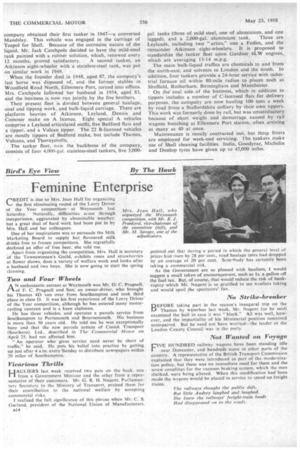Feminine Enterprise
Page 48

If you've noticed an error in this article please click here to report it so we can fix it.
rREDTT is due to Mrs. Jean Hall for organizing
the first eliminating round of the Lorry Driver of the Year competition at Weymouth last Saturday. Naturally, difficulties aiose through inexperience, aggravated by abominable weather. but a great deal of hard work had been put in by Mrs. Hall and her colleagues.
One of her inspirations was, to persuade the Milk Marketing Board to supply hot flavoured milk drinks free to frozen competitors. She regretfully declined an offer of free beer, she told me.
Apart from organizing the competition. Mrs. Hall is secretary of the Townswomen's Guild, exhibits roses and strawberries at flower shows, does a variety of welfare work and looks after a husband and two boys. She is now going to start the spring cleaning.
Two and Four Wheels
AN enthusiastic entrant at Weymouth was Mr. D. C. Pragnell, of F. C. Pragnell and Son, an owner-driver, who brought his Thames 4D van over from Southampton and took third place in class p. It was his first experience of the Lorry Driver of the Year competition, although he has entered many motorcycling contests and is a keen clubman.
He has three vehicles, and operates a parcels service from Southampton to Portsmouth and Bournemouth. His business is more than 50 years old. He told me he was exceptionally busy and that the new parcels system of Cusick Transport (Southern). Ltd., described in The Commercial Motor on April 25, had not affected him.
" An operator who gives service need never be short of traffic," he said. He puts his belief into practice by getting up just after 4 a.m. every Sunday to distribute newspapers within 20 miles of Southampton.
Vicarious Thrills
HAULIERS last week received two pats on the back. one from a Government Minister and the other from a representative of their customers. Mr. G. R. H. Nugent, Parliarnentary Secretary to the Ministry of Transport, praised them for their contribution to the national welfare by accepting commercial risks.
I realized the full significance of this phrase when Mr. C. S. Garland, president of the National Union of Manufacturers. " pointed out that during a period in which the general level of prices had risen by 28 per cent., road haulage rates had dropped by an average of 20 per cent. Som.body has certainly been taking a commercial risk.
As the Government are so pleased with hauliers, I would suggest a small token of encouragement, such as ls. a gallon off the fuel tax. But, of course, that would reduce the risk of bankruptcy which Mr. Nugent is so gratified to see hauliers taking and would spoil the spectators' fun.
No Strike-breaker
BEFORE taking part in the season's inaugural trip on the Thames by waterbus last week, Mr. Nugent (so he said) examined the hull in case it was "black." All was well, however, and the impartiality of his Ministerial position remained unimpaired. But he need not have worried—the leader of the London County Council was in the party.
Not Wanted on Voyage
FIVE HUNDRED railway wagons have been standing idle near Doncaster, and hundreds more in other parts of the country. A representative of the British Transport Commission explained that they were introduced as part of the modernization policy, hut there was no immediate need for them and the screw couplings for the vacuum braking system, which the men disliked, were being altered. When this modification had been made the wagons would be placed in service to speed up freight trains.
























































































